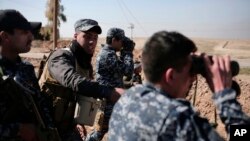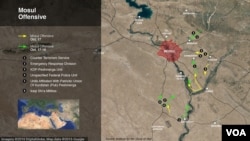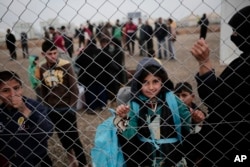Iraqi troops have pushed into the southern outskirts of Mosul as they consolidate their position on the third day of a rebooted offensive to take the city, a military spokesman said.
A coalition of troops from the federal police, interior ministry Rapid Response units, and other soldiers took part in the renewed push, which began Sunday and so far has secured an additional 123 square kilometers south of Mosul, the spokesman of the Joint Military Operation Command said.
The U.S.-backed Iraqi forces reached the Mosul airport on Monday after removing Islamic State jihadists from a nearby in Albu Saif, according to an Iraqi military statement.
"We are in Albu Saif and we started to clear houses from bombs, and we are conducting house-to-house search," said Police Lieutenant Colonel Hussein.
After Iraqi forces re-take the airport, they plan to use it to launch attacks in the offensive on western Mosul, which is still under the control of IS fighters.
Mosul is split roughly down the middle by the Tigris River. Iraqi forces removed the militants from the eastern side of the city last month.
The IS group took over Mosul, Iraq’s second-largest city, in 2014. There are an estimated 750,000 civilians in western Mosul, essentially under siege by Iraqi forces, along with IS fighters.
Many of those civilians in western Mosul were forced out of the eastern part of the city during heavy fighting there last month.
Refugee deluge expected
Meanwhile, aid agencies are worried and preparing for the possibility that up to 250,000 people might flee the Mosul in the coming days or weeks.
The U.N. refugee agency is focusing its efforts on building new camps to house the displaced. The UNHCR has completed eight camps and says it is planning to start work at another site south of Mosul.
UNHCR spokesman Matthew Saltmarsh said there was room in several of these sites to shelter new arrivals. But once the predicted exodus begins, he said, it will be impossible to accommodate such large numbers on existing land.
Meanwhile, Saltmarsh said conditions are raising concern for the well-being of civilians in the city.
"There are shortages of food, water, fuel and medicine," he said. "Half of all food shops have closed, and most people can only access untreated water at the moment. Food prices are rocketing, and there are reports of families burning furniture, clothing and plastic to stay warm. Conditions will deteriorate if civilians are not able to flee the fighting."
Protecting civilians
During the battle for eastern Mosul, Iraqi forces prioritized the protection of the civilian population in its military planning. Saltmarsh said he hoped this principle would continue to be upheld in western Mosul, but he told VOA it was likely to be more difficult to avoid civilian casualties in the densely populated western part of Mosul.
"We do not have any official estimates of or predictions of the numbers who might be killed, but obviously, we are extremely concerned because the fighting is expected to be extremely intense once it gets into the urban areas," Saltmarsh said. "And, of course, there is a risk of hostages and human shields."
Meanwhile, the World Food Program said it was extremely concerned about the welfare of 750,000 people still trapped in western Mosul. WFP said it had enough food stock in the area for 770,000 people. It called for unimpeded access to all those in need.
Lisa Schlein contributed to this report from Geneva.







